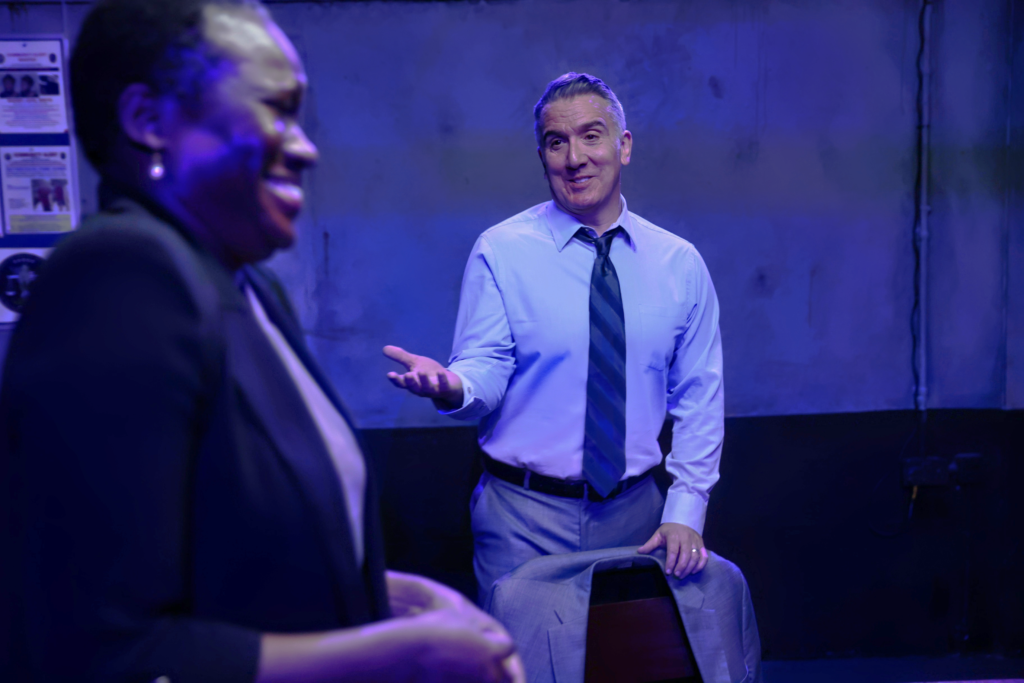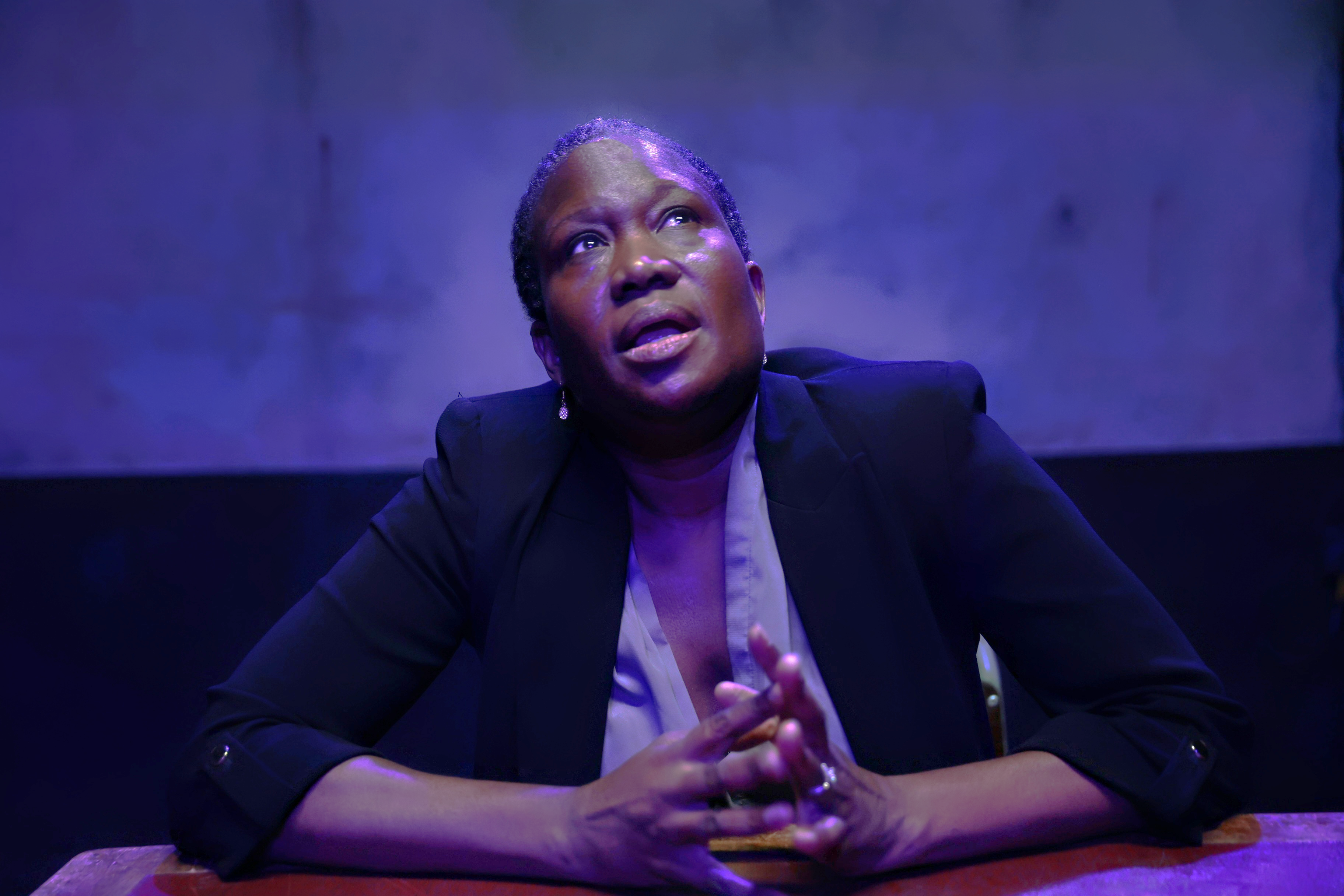BLUE – No Boundaries Theatrical Productions / Seven Dials Playhouse, London
After runs in LA and at the Edinburgh Fringe, June Carryl’s BLUE brings an interesting perspective on contemporary American society to London audiences.

BLUE
It’s interesting sometimes, thinking about the dialogue between plays that you see. On consecutive nights this week I’ve seen For Black Boys… by Ryan Calais Cameron, and then BLUE, a work written by and featuring June Carryl. Both have now had multiple runs at different venues. Both address issues facing contemporary society and in particular Black communities. Their approaches, however, are vastly different.
BLUE takes us far away from London. This hour-long work is set in 2021 in the aftermath of a shooting of an unarmed man by an LAPD officer. Sergeant Boyd Sully (John Colella) is in the hot seat, and the interrogating officer is none other than his old friend LaRhonda Parker (Caryll). We watch in real time as the interview unfolds, questions about gun hand placement and who was following whose car interspersed with reminiscences about fishing trips and asking after each other’s families. Sully assures Parker (and us) he’s not a racist. He voted for Obama!
Because, you see, if the events described in BLUE were a genuine case, it would have been one of 1,145 US killings by law enforcement in 2021. But, more specifically, Sully, a White officer, has killed David Mason, a Black man. Parker, too, is Black. In the charged aftermath of the murder of George Floyd and the January 6th insurrection, this adds tension to proceedings as they inevitably come to a head.
A Society Divided
A wise fellow theatre goer said to me that there is a fine line between a play like this being powerful and emotive, or heavy-handed and berating its audience. We agreed that BLUE walks the right side of that line. Not so far over it, but the right side. Without giving too much away, that is because it’s not a simplistic story. Carryl holds a mirror to contemporary America, exploring how deep the divisions run and the extent to which they are pushed aside on a day to day basis in order to maintain social order. That colleague or neighbour you know holds different views but you still make cheery small talk with. Scratch the surface and…
The pressure cooker situation Carryl creates is perfect. Layer by layer, she realistically strips back all the niceties and lays the gulf between Parker and Sully bare. Importantly, however, although most audience members will come away from BLUE with a clear sense of whose ‘side’ they are on, ultimately neither character is blameless. This keeps us in a space which is much more interesting than black and white moral certainties.
This is the third outing for BLUE, after a debut at LA’s Rogue Machine Theatre and a run at the Edinburgh Fringe last year. I’m not sure why London was chosen as the next venue. For me it was a great opportunity to see new perspectives, writing, and stories, but I hope it will get the reach it deserves while at the Seven Dials Playhouse. Despite being an import and addressing issues from the perspective of its LA home, deeply divided and fractured societies are sadly not a limited phenomenon in this day and age. There is much we can learn from the lessons BLUE teaches. We only need to look at Chris Kaba for a debate about police killings close to home.
What Divides and Unites Us
In each of the three runs, Carryl has played Parker. It’s interesting to see a playwright acting out their own character. Carryl writes dialogue well: we feel the tussle for power as Sully and Parker each try to leverage their past relationship and hidden knowledge to gain the upper hand. Sully is a worthy adversary in this. His character is the less sympathetic, but Colella brings him to life with humanity and complexity.
This was my first time in the Seven Dials Playhouse, which opened in 2022. BLUE plays in the round in its underground space. Designer Carla Goodman has used the room cleverly, creating a believable police interrogation room (if you ignore the row of people around the edge). The layout gives an immediacy which works well with the scenes’ emotional intensity.
All in all I enjoyed BLUE. It felt like a visitor to the London theatre scene, a rare chance to experience an LA transfer. But more than that, it is an opportunity to reflect on what divides and unites us, and how much we have to understand about the mindset of those separated from us by the fragmentation of politics, culture and society. A sobering thought. And the list of names read out in the play’s final moments is a reminder of what’s at stake when we can no longer connect and see eye to eye.
Salterton Arts Review’s rating: 4/5
BLUE on at Seven Dials Playhouse until 30 March 2024, including Black Out nights on 18 and 27 March. More info here.
Trending
If you see this after your page is loaded completely, leafletJS files are missing.

